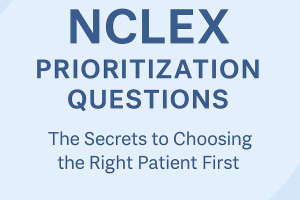How to Overcome Test Anxiety and Stay Calm on NCLEX Exam Day

Test anxiety is a common challenge for NCLEX candidates. The pressure to pass, the difficulty of the questions, and the fear of failure can all contribute to nervousness and self-doubt. However, managing anxiety effectively is crucial for performing well on exam day.
In this guide, we’ll explore why NCLEX test anxiety happens and provide practical strategies to help you stay calm, confident, and focused when it matters most.
Why Do NCLEX Test-Takers Experience Anxiety?
Anxiety before a big exam like the NCLEX is normal, but excessive stress can hurt performance. Some of the most common reasons for test anxiety include:
✅ Fear of the unknown – Worrying about the types of questions, the difficulty level, and the test format.
✅ High expectations – Feeling pressure from yourself, family, or peers to pass on the first attempt.
✅ Poor preparation – Lack of confidence due to inadequate study time or ineffective study methods.
✅ Negative self-talk – Doubting your ability to succeed or focusing on past failures.
✅ Physical symptoms – Racing heartbeat, sweating, nausea, or headaches triggered by stress.
The good news? Anxiety can be managed, and you can train your mind to stay calm under pressure.
Pre-Exam Strategies to Reduce Anxiety
1. Build Confidence Through Consistent Preparation
The best way to fight test anxiety is to prepare well. Use reliable NCLEX resources, practice with high-quality questions, and focus on weak areas.
Action Steps:
✔ Follow a structured NCLEX study plan.
✔ Take at least 75-100 practice questions daily.
✔ Simulate the real NCLEX with timed practice exams.
2. Master Relaxation Techniques
Train yourself to stay calm under pressure using relaxation exercises.
Deep Breathing Exercise:
- Inhale deeply through your nose for 4 seconds.
- Hold your breath for 4 seconds.
- Exhale slowly through your mouth for 4 seconds.
- Repeat 4 times until you feel calmer.
Progressive Muscle Relaxation:
- Tense and release different muscle groups, starting from your toes up to your head.
- Helps reduce physical symptoms of anxiety like shaking or muscle tension.
Meditation & Visualization:
- Picture yourself sitting at the NCLEX, feeling calm and confident.
- Imagine reading questions carefully and choosing correct answers.
3. Get Plenty of Sleep Before Exam Day
Lack of sleep increases anxiety and affects memory recall. Aim for 7-9 hours of sleep the night before your NCLEX.
Tips for Better Sleep:
✔ Stop studying at least 2 hours before bedtime.
✔ Avoid caffeine or heavy meals late at night.
✔ Try guided sleep meditations to relax.
4. Plan Your Exam Day in Advance
Being prepared for the logistics of test day prevents unnecessary stress.
What to Do:
✅ Know your NCLEX test center location and how long it takes to get there.
✅ Pack your ID, ATT letter, and any allowed items the night before.
✅ Eat a balanced breakfast with protein and healthy carbs for sustained energy.
✅ Arrive at least 30 minutes early to avoid last-minute panic.
Strategies to Stay Calm During the NCLEX
1. Use the “STOP” Method When Anxiety Hits
If you start feeling anxious during the test, try this:
- S – Stop and pause for a few seconds.
- T – Take a deep breath to reset your mind.
- O – Observe your thoughts and remind yourself that you are prepared.
- P – Proceed with confidence, answering one question at a time.
2. Focus on One Question at a Time
- Don’t stress about how many questions you’ll get—just focus on the question in front of you.
- If a question is difficult, take a deep breath, eliminate wrong answers, and make an educated guess if needed.
3. Take Mini Mental Breaks
- If you feel overwhelmed, pause for 10-15 seconds, close your eyes, and take a deep breath before continuing.
- Stretch your fingers or roll your shoulders to release tension.
4. Reframe Negative Thoughts
Replace negative self-talk with positive affirmations:
❌ “I don’t think I can pass.” → ✅ “I have studied hard, and I am ready for this.”
❌ “This test is too hard.” → ✅ “I will take my time and answer carefully.”
5. Trust Your Preparation
You have spent months preparing. You’ve taken practice tests, reviewed content, and learned test-taking strategies. Trust that you know more than you think and focus on doing your best.
Post-NCLEX: Managing Anxiety While Waiting for Results
The waiting period after taking the NCLEX can be stressful. Here’s how to stay calm:
✔ Avoid overanalyzing your test. The NCLEX is designed to be challenging, and everyone feels unsure afterward.
✔ Distract yourself with activities. Spend time with family, exercise, or start a new hobby to keep your mind busy.
✔ If needed, use quick results. If your state offers the NCLEX quick results (available in 48 hours for a small fee), you can check your status sooner.
Final Thoughts
NCLEX anxiety is normal, but it doesn’t have to control your performance. By preparing well, practicing relaxation techniques, and staying focused on the moment, you can take your exam with calmness and confidence.
If you’ve struggled with test anxiety before, what strategies have helped you? Share in the comments below!






